Johnny Campbell – A Continuing Life in Table Tennis
by Charlie Ellis.
The long-term health benefits of table tennis and its positive impact on mental sharpness have received a great deal of attention in recent years. A figure such as Johnny Campbell surely illustrates these benefits of the sport. Campbell is now back playing regular league table tennis (for Edinburgh Sports Club in the ELTTL), as well as playing in the over 75’s category in the Scottish Veterans’. I caught up with Campbell at the recent Scottish Veterans’ Assessment in Bathgate (November 17th 2019) and we chatted about his long and continuing life in table tennis.
Campbell plays once a week with an old friend and table tennis rival Eddie Still. Campbell and Still go way back and played in the Scottish National Championships singles final in 1952, a match Campbell can ‘remember to this day’. He has every reason having won the match to take his sole national title; he is able to rattle off the scores without a pause- 21-10, 21-12, 22-20. Campbell had battled past Gordon Fraser (of the Craigmillar club in Edinburgh) in the semi-final. He relates that the final was a classic clash of styles with Still’s determined chiselling defence against his own fast attacking style. Campbell’s compact and punchy strokes are still on display in 2019 as he defeated fellow octogenarian Jack Oughton (a top player in England in his day: described in the ETTA’s Table Tennis magazine in 1957 ‘as one of the most spectacular figures in the North East, and on his day is likely to beat anyone by sustained aggression’) 3-1 in a match of impressive quality.
Campbell grew up in Glasgow ‘within easy walking distance of’ the Central YMCA on Sauchiehall Street (the Central Halls Building) where he first tried and learnt the sport. Luckily the YMCA was at the time the top club in the West of Scotland. Alongside Gambit in Edinburgh (led by Helen Elliott and Bert Kerr), the Central YMCA was one of the powerhouses of Scottish table tennis – with several top players in its ranks, including Eddie Still (who had moved from his native Aberdeen). Campbell remains full of praise for Still (Scottish champion in 1953) who had a ‘dazzling record’ when playing in the West; once going through an entire season in the WOSTTL without losing an end. Campbell went on to become ‘a prime mover within the YMCA’ (alongside other figures such as Eddie Latham & Jimmy Coyne) until its closure and demolition in the late 50s. He’s since been involved in clubs in Milngavie and Drumchapel. In his working life he held a number of finance related positions, ending up with a senior role in the finance department of Glasgow University.
He first started playing competitive league table tennis for the Central YMCA, as part of its youth team. He recalls his first ever match (aged 14) in the boiler room of a rubber belting factory where the match was interrupted every 20 minutes so that coal could be shovelled into the boiler. This was typical of the era when most factories and big companies had table tennis teams- the disappearance of these works teams contributed significantly to the dramatic reduction in size suffered by local leagues in Scotland in the 80s and 90s. At one time the West of Scotland League had 12 divisions with two divisions for ladies. Campbell recalls that league matches at the YMCA would often attract a crowd of 30 or 40 people and the big tournaments would also attract media attention and big crowds. He recalled the popularity of table tennis in that era- ‘it was a huge sport’ with tournaments such as the Daily Mirror championships on television and up to 400 hundred entrants for the Scottish Nationals. In part this was a product of the scarcity of things and activities in the post-war period (‘every cinema had long queues’ such was the demand for entertainment).
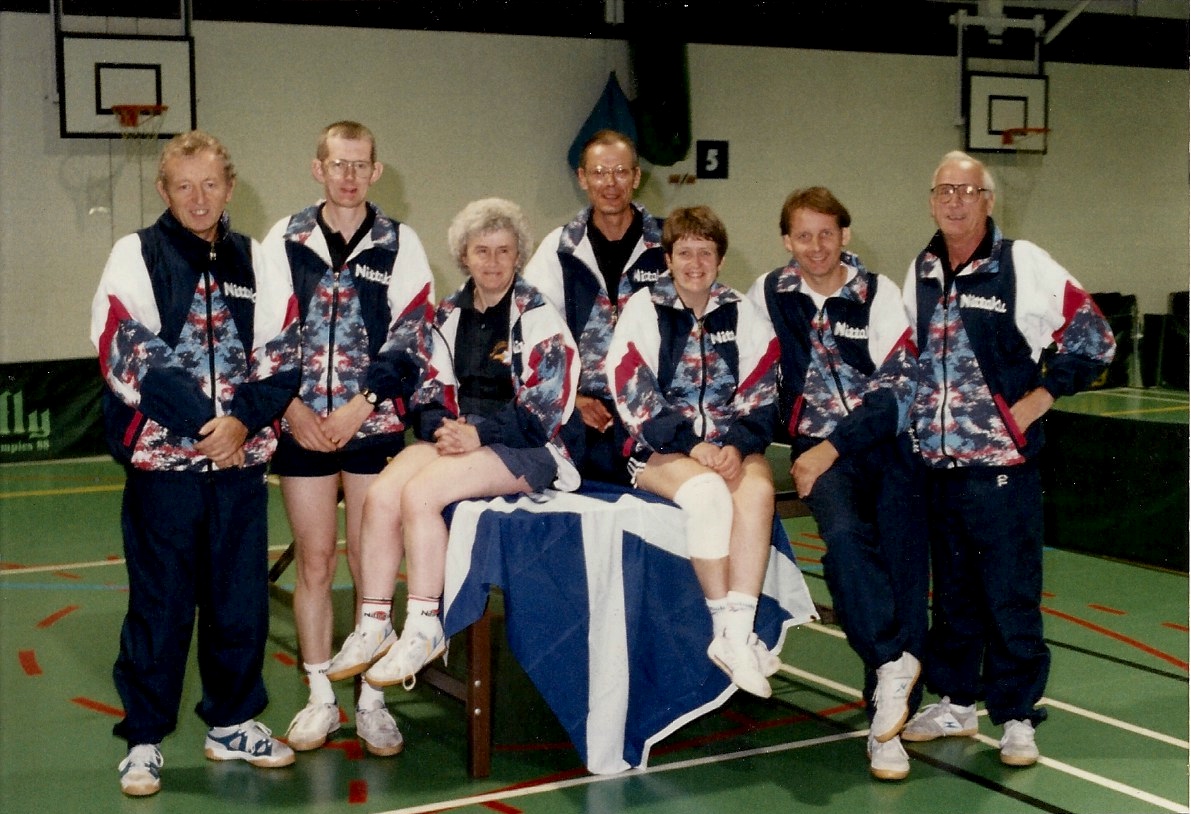
This photo by Mike MacLaren dates back to 1997 when the inaugural Six Nations Championships were held in Dundee. The players are, from left to right, Brian Morgan, Jeremy Lappin, Linda Powell, Geoff Salter, Isobel Lappin, Richard Yule and Johnny Campbell.
Campbell’s first big breakthrough came at the 1950 West of Scotland Championships where he lost to Monty McMillan (‘a shining star of the game briefly’ who performed well at the English Open juniors- ‘when that was a world-class tournament’). On the back of his national championships success Campbell went on to represent his country 9 or 10 times but didn’t manage to play in the world championships. He ‘should have played in Utrecht’ in April 1955 but national service (in the RAF) prevented him from doing so, much to his chagrin. Though he didn’t mix it with the world’s best, he did take part in a coaching session run by the legendary Victor Barna and also played Richard Bergmann at Butlins at Ayr when Campbell was just 14. He recalls the other top players of the era included Alec Metcalfe (Scottish National champion in 1954), John Braithwaite and Tommy Gilmour. He recalled that the women’s team tended to struggle on the international stage, apart from of course Helen Elliott. Of the match versus Ireland detailed in the programme at the foot of the article, Campbell says: ‘my memories of this match are that we were four teenagers inexperienced at this level playing a strong Ireland team which was not far away from European standard so no disgrace at losing all four singles. And on reflection I am pleased I took such a good player as Sean Clerkin to -18 in the first end’.
The big rivalries in Scottish table tennis at the time included that between the YMCA and Gambit who often tussled in the Scottish Cup. He makes particular mention of Tommy McMichael of Gambit ‘as a doyen of the Edinburgh scene’. He recalls that there were a lot of intense rivalries and it could be a ‘ rather bad-tempered sport’. Once classic encounter between the clubs took place in the Scottish Cup in 1953 (at Murrayfield Indoor Sports Club, Roseburn Street, Edinburgh). As Campbell outlines there was some bad blood between the clubs: ‘several years previous to the match cited, they met in the final. The match was played in Edinburgh on a Saturday night and ended in controversy. The score was tied with several games still to be played when the Central players had to leave to catch the last train back to Glasgow. As you can guess there was a huge brouhaha over this and after much argument and discussion the match was belatedly awarded to Gambit (incidentally, the last train left around 9pm)’. The scorecard below illustrates the quality of the two sides (all those involved were Scottish Internationalists):
Match report: by this defeat the [Gambit] relinquished its hold on the Scottish Cup. On the night’s display the better team won. The losers lacked balance and seemed nervous. Bertie Kerr commenced well but fell away badly as the match progressed. Helen was the best of the Gambit team but seemed to tire at the end. Syd was below form and missed chances, his narrow defeat by Campbell was really the turning point- this was a game Syd could have won. For [Central] Eddie Still played the best and by his easy win over Bertie gained some revenge for defeats in the finals of the East of Scotland and the Midlands tournaments. Metcalfe played much better than his scores indicate. Campbell could do nothing with Helen’s “chop”, and was a little lucky against Syd; his win over Bertie was made easier by his opponent’s unsteadiness. It is a remarkable fact that this defeat was only the third Scottish Cup defeat in the club’s history.
(Scorecard and match report from an unpublished manuscript on Gambit’s early years by R. F. D. Hayman, long-time secretary of Gambit TTC).
Unlike Still, who became Scottish national coach, Campbell had only ‘now and again’ become involved in coaching something which he ascribes to his is instinctive play- rather than being someone who analyses the sport.
Campbell is a modest about his achievements on the table, suggesting that is national championships win was something of a ‘flash in the pan’. He stopped playing in the 60s and made the odd comeback before returning to the sport in the mid-90s. As to his other achievements in the game he mentions performance at the US Nationals in Houston he picked up a silver in doubles and bronze in singles. He also cites his victory in the over-70s singles at the Six Nations Veterans’ event as another highlight. As ever, Campbell is still looking to the future- he has entered the over 85s event at the next Veterans’ World Championships, in Bordeaux next July.
Campbell was one of those involved in getting the Scottish veterans going, for a time acting as international secretary and also starting the SVTTA website- ‘ though it’s off obviously changed a lot since then’. For a time he lost touch with Scottish table tennis due to spending a lot of time in the States. He played whilst there though found many American players rather over-competitive and ratings obsessed.
Campbell began playing in the hardbat era (though some people would play with sandpaper and plain wooden bats-if not in competitive play) and only changed to rubber about 10 years ago (he plays with short pimples on both sides). He recalls the fuss made when Johnny Miller (the best of the Polish players who played for Gambit TTC in Edinburgh- Miller became a naturalised Scot-his original name was something along the lines of Zbigniew Muller) became the first top player in Scotland to use a sponge bat (not the modern style but the type used by some Japanese players in the early 1950s, with really thick sponge). As a result people tended to relate Miller’s successes (national champion in 1955) to his bat and not his substantial abilities. Campbell remains skeptical as to whether sponge improved the sport: ‘the new equipment has changed the game-but I’m not sure if it’s improved it’. He’s aware that such a comment might lead to accusations of grumpy old man syndrome but in his continued enthusiasm for life and table tennis he debunks this.
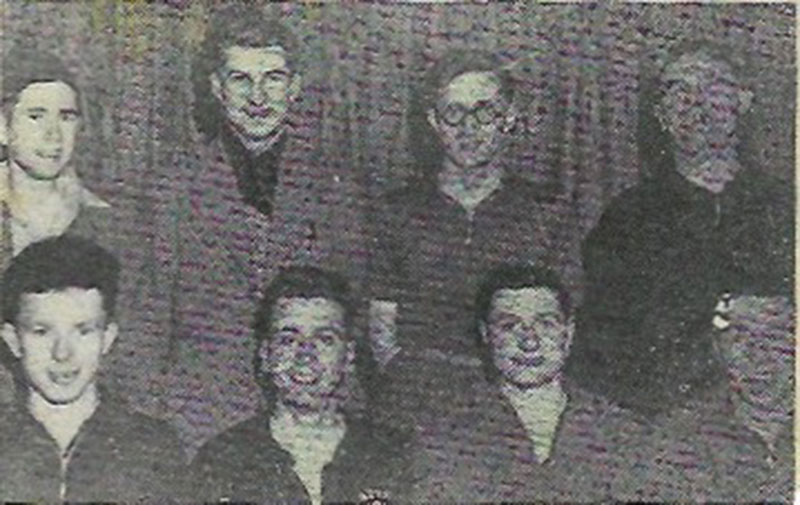
The rather blurred photo is from a local Liverpool newspaper and dates from March 1953 when the West of Scotland played Liverpool and District. The Scottish players are in the front row and are, from left to right, Alex Culloch, Johnny Campbell, Eddie Still and Alec Metcalf.
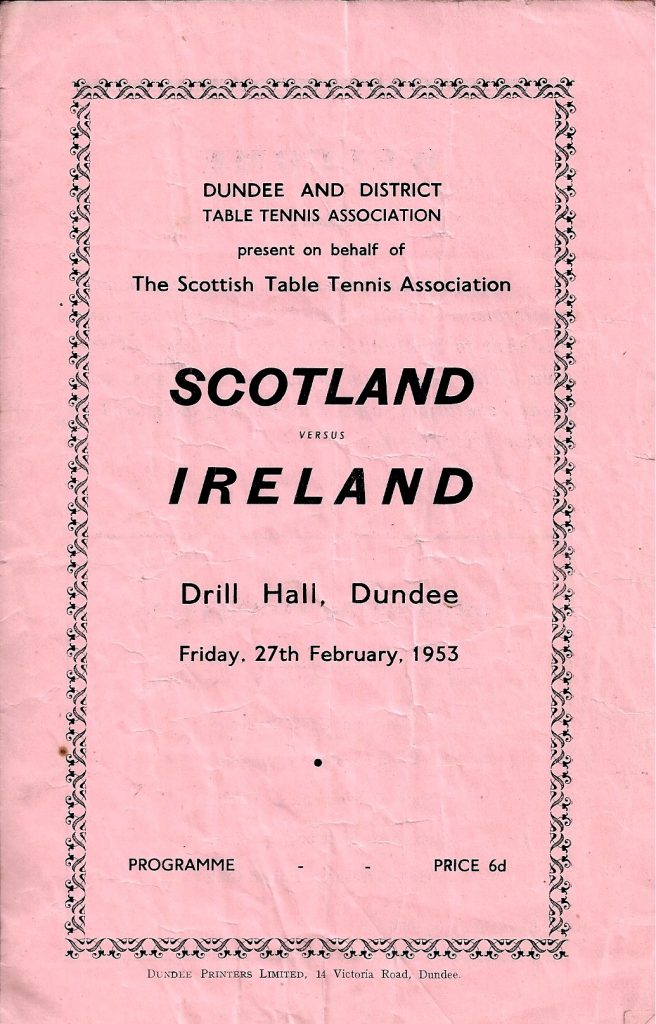
Programme from International match with Ireland in 1953.
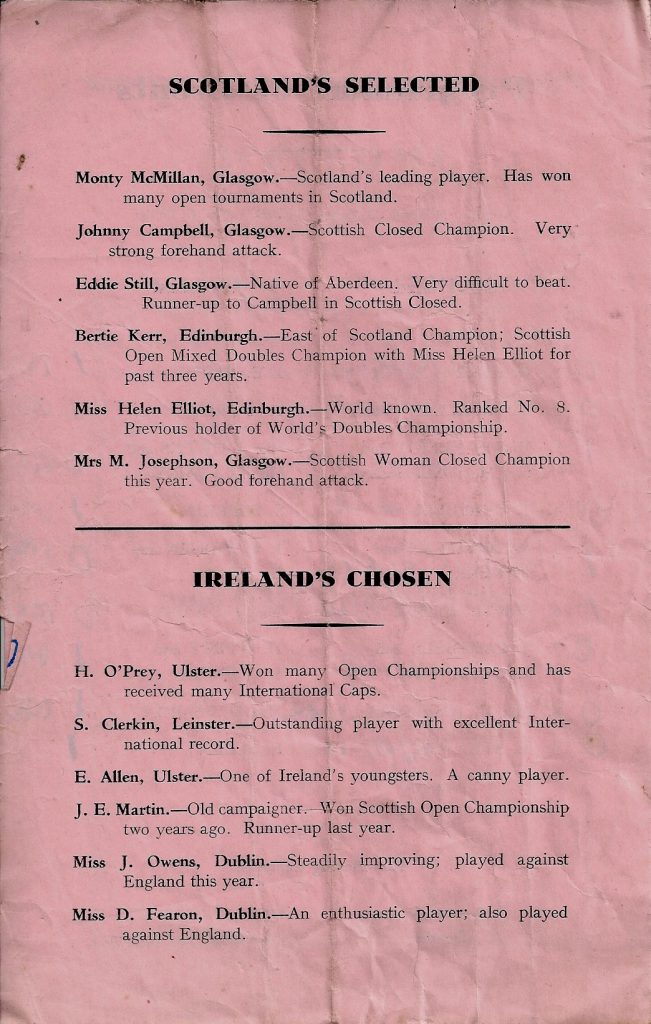
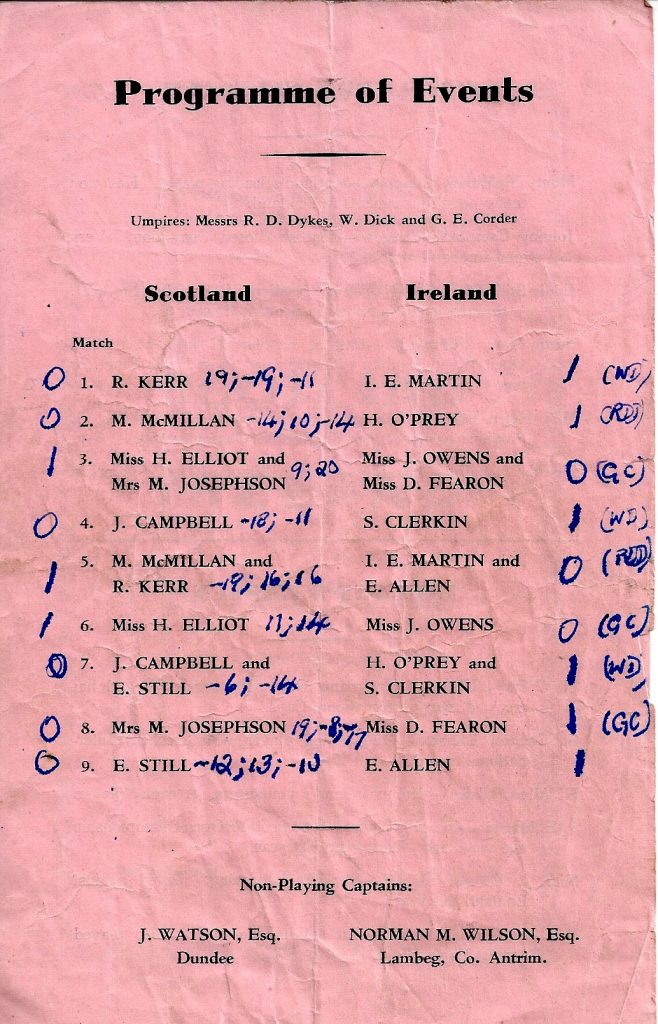
Recommended Posts

Priority Window Now Live!
December 15, 2025

ITTF World Team Table Tennis Championships London 2026
December 15, 2025

